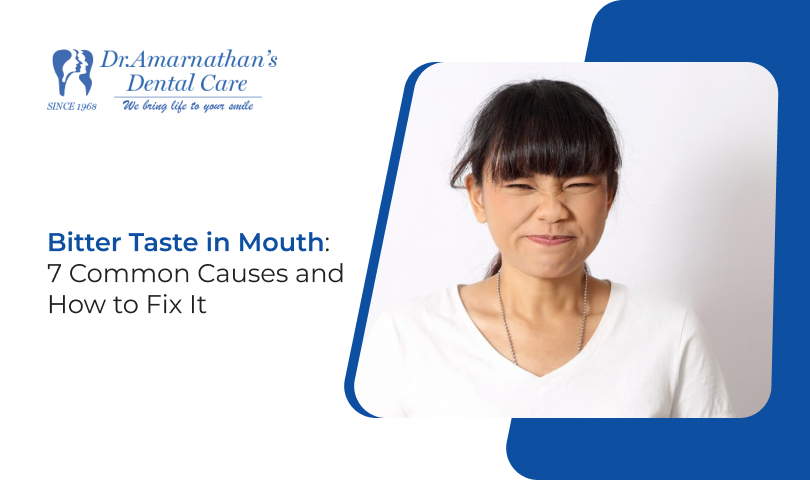
Bitter Taste in Mouth: 7 Common Causes and How to Fix It
A persistent bitter taste in your mouth can be more than just an unpleasant sensation – it’s often a sign of an underlying issue. Whether it’s due to poor oral hygiene, medication, or a medical condition, the cause can vary. You’re not alone if you’re tired of constantly battling that unpleasant taste. In this blog, we’ll explore 7 common causes of a bitter taste in the mouth and provide practical solutions to help you regain fresh breath and improve your oral health. Let’s dive in and uncover the reasons behind this problem and ways to fix it once and for all.
1. Poor Oral Hygiene – A Leading Cause of Bitter Taste
Poor oral hygiene is one of the most common causes of a bitter taste in your mouth. When you don’t brush or floss regularly, plaque and food particles can build up on your teeth and gums. This can lead to the growth of bacteria, which produce acids that contribute to an unpleasant taste in your mouth.
How to Fix It:
- Brush twice a day with fluoride toothpaste.
- Make sure to floss daily to dislodge food particles trapped between your teeth.
- Rinse with an antibacterial mouthwash to eliminate bacteria and keep your breath fresh.
- Visit your dentist regularly for cleanings and checkups.
2. Medications That May Leave a Bitter Taste in Your Mouth
Certain medications can cause a bitter or metallic taste as a side effect. Common drugs like antibiotics, antihistamines, blood pressure medications, and antidepressants can affect the taste buds or dry out your mouth, leading to an unpleasant aftertaste.
How to Fix It:
- Talk to your doctor about possible alternatives if the taste persists.
- Drink plenty of water to help wash away the bitter taste.
- Chew sugar-free gum or mints to stimulate saliva production, which can help neutralize the taste.
3. Acid Reflux and Heartburn – How They Contribute to a Bitter Taste
Acid reflux occurs when stomach acid flows back into the esophagus and sometimes into the mouth. This acid can cause a sour or bitter taste, especially after eating or lying down. Chronic acid reflux is also known as gastroesophageal reflux disease (GERD).
How to Fix It:
- Steer clear of foods that can trigger discomfort, such as spicy, fatty, and acidic items.
- Opt for smaller meals throughout the day and refrain from eating right before bed.
- Elevate your head while sleeping to reduce acid reflux at night.
- Consider taking antacids or other medications your doctor prescribes to control reflux symptoms.
4. Dry Mouth (Xerostomia) and Its Impact on Taste
A dry mouth, or xerostomia, occurs when your salivary glands don’t produce enough saliva. Saliva plays a crucial role in washing away food particles and bacteria, so food debris and bacteria can build up when it’s insufficient, leading to a bitter taste. Medications, dehydration, or certain health conditions can also cause dry mouth.
How to Fix It:
- Drink water regularly to keep your mouth hydrated.
- Utilize saliva substitutes or mouthwashes specifically formulated for dry mouth.
- Chew sugar-free gum or lozenges to stimulate saliva production.
- If dry mouth persists, consult your doctor for other treatment options, such as medications that help increase saliva flow.
5. Gum Disease – Could It Be the Source of Your Bitter Taste?
Gum disease, or periodontal disease, occurs when bacteria in plaque infect the gums and tissues around your teeth. Early-stage gum disease (gingivitis) can lead to bad breath and a bitter taste. In more severe cases, when the infection progresses to periodontitis, it can cause further discomfort, including a persistent sour taste.
How to Fix It:
- Maintain good oral hygiene by brushing and flossing daily.
- See your dentist for regular cleanings and checkups to prevent gum disease.
- If you already have gum disease, your dentist may recommend a professional cleaning, scaling, or other treatments to manage the condition.
6. Sinus Infections and Post-Nasal Drip: Surprising Causes of Bitter Taste
Sinus infections or allergies can lead to a condition known as post-nasal drip, where mucus drips down the back of the throat. This mucus can taste bitter or sour, which may linger in your mouth. Sinus infections often include symptoms like nasal congestion, headaches, and facial pressure.
How to Fix It:
- Treat the underlying sinus infection with medications prescribed by your doctor.
- Use a saline nasal spray to clear out mucus and relieve congestion.
- Stay hydrated to help thin mucus and prevent it from lingering in your throat.
- Gargle with salt water to soothe your throat and reduce the bitter taste.
7. Diabetes and Bitter Taste – Understanding the Connection
In people with diabetes, a bitter taste in the mouth can occur due to high blood sugar levels. Uncontrolled diabetes can lead to a condition called diabetic ketoacidosis (DKA), where the body starts breaking down fat for energy, producing chemicals called ketones. These ketones can leave a fruity, sometimes bitter, taste in the mouth.
How to Fix It:
- Manage your blood sugar levels through diet, exercise, and medication as your doctor prescribes.
- Regularly monitor your blood glucose to keep it within the target range.
- Stay hydrated to help flush out excess sugar and ketones from your body.
How to Fix a Bitter Taste in Your Mouth: 5 Simple Solutions
If you’re struggling with a bitter taste, the good news is that many of the causes are treatable. Here are five quick and easy solutions to help you get back to enjoying fresh breath:
- Stay hydrated: Drink plenty of water to keep your mouth moist and help wash away bacteria.
- Practice good oral hygiene: Brush, floss, and use mouthwash to keep your mouth clean and bacteria-free.
- Chew sugar-free gum or mints: These can help stimulate saliva production and mask the bitter taste.
- Adjust your diet: Avoid foods that may trigger reflux or exacerbate dry mouth.
- Visit your dentist or doctor: If the bitter taste persists, it could indicate an underlying condition that needs professional care.
Conclusion
A bitter taste in the mouth can have a variety of causes, ranging from simple issues like poor oral hygiene to more complex health conditions like diabetes or acid reflux. By understanding the common triggers and taking proactive steps to address them, you can effectively manage or eliminate the unpleasant taste and improve your overall oral health. If the problem persists, don’t hesitate to seek advice from your dentist or healthcare provider to rule out more serious conditions and get the relief you deserve.





My bitter mouth started when I had sore throat. The bitterness seem like a liquid seep into my mouth from my gut
Causes of this bitterness and how to treat it
Causes of this bitterness and how to treat it or solution to it